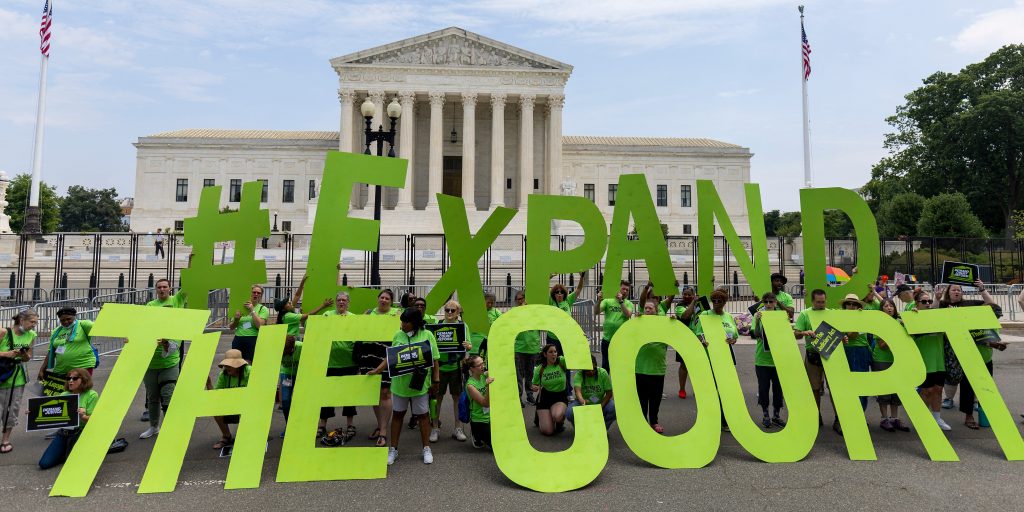- Activists are renewing calls to expand the Supreme Court in response to its decision overturning Roe v. Wade.
- Court expansion is unlikely to happen given President Joe Biden's opposition and a lack of congressional support for the idea.
- The court currently holds a 6-3 conservative majority.
The Supreme Court's historic decision to end federal abortion rights in the United States has triggered calls to add more justices to the bench to offset its conservative majority. But with President Joe Biden against the reform and a lack of congressional support, it's unlikely to happen.
The nation's highest court voted 5-4 on Friday to overturn Roe v. Wade, the landmark decision that legalized abortion almost 50 years ago. The monumental ruling means abortion is no longer a constitutional right, giving states the authority to ban the procedure. Since then, a slew of Republican-led states — with more to follow — have already enacted restrictions on abortions, impacting nearly half of the country.
The consequential decision has led some Democrats and abortion-rights activists to demand for the Supreme Court to be expanded in size — a change that aims to counteract the current conservative majority and its rulings by establishing an ideologically balanced court.
"We can do it! We can at least TRY," Rep. Alexandria Ocasio-Cortez of New York, a progressive Democrat, tweeted this week along with a list of possible responses to the reversal of abortion rights.
—Alexandria Ocasio-Cortez (@AOC) June 25, 2022
There is nothing in the Constitution about the number of justices on the Supreme Court. Congress has the power to decide its size. Since 1869, that number has been nine. Before that, it historically ranged between five and 10 justices. The last major attempt to expand the court, under President Franklin D. Roosevelt, failed in Congress.
Any effort to increase the court's size now is nearly guaranteed to fail as well. That's largely because Biden, who's previously rejected the idea, remains against it.
"That is something that the President does not agree with. That is not something that he wants to do," White House press secretary Karine Jean-Pierre told reporters over the weekend.
Besides Biden, congressional Democrats simply do not have enough support to pass a bill that would add more justices to the court. The party only holds a slim majority in the Senate, which requires 60 votes to overcome the filibuster and advance legislation. And Democratic Sens. Kyrsten Sinema of Arizona and Joe Manchin of West Virginia have long been against eliminating the filibuster to push through the party's priorities.
Democratic leaders, such as House Speaker Nancy Pelosi, have also been reluctant to embrace court expansion. She dismissed a bill introduced last year by a group of Democratic lawmakers that would have raised the court's size to 13 justices, but said the idea isn't completely off the table for the future. In response to the Supreme Court's decision on Friday, Pelosi focused the discussion on legislation that would restore abortion rights rather than expand the court. She called on voters to elect Democrats this November so they can push for such a bill in Congress. Biden urged for the same in a speech on Friday.
Liberal advocates have previously proposed court expansion in a bid to exert some judicial control as the Supreme Court's makeup became more conservative. President Donald Trump's appointment of three justices in his one term prompted outbursts on the left that the court's newly expanded 6-3 conservative majority could threaten a number of constitutional rights, including abortion. To prevent that scenario, some Democrats floated the idea of adding more seats to the bench. Republicans, widely opposed to such a move, repeatedly characterized it as "court packing," attempting to cast the effort as a partisan power-grab of the Supreme Court.
Biden last year created a bipartisan commission to study court reforms in response to widespread pressure from members of his party to look into this issue. The commissioners examined increasing the court's size, setting term limits for justices, and other issues, providing an analysis but not recommendations for what the White House should consider. The report, released in December, largely flew under the radar and Biden's position on court expansion has stood.
Although most Americans disagree with the Supreme Court's reversal of Roe v. Wade, a majority of the country does not want more justices on the bench, according to a national poll by NPR/PBS NewsHour/Marist released Monday.

